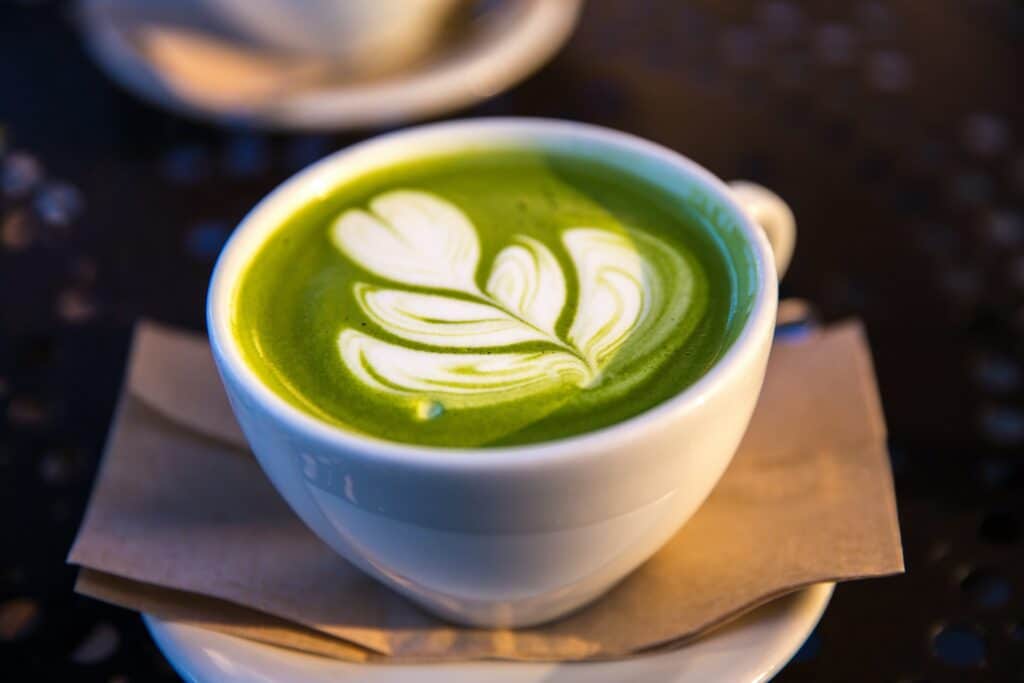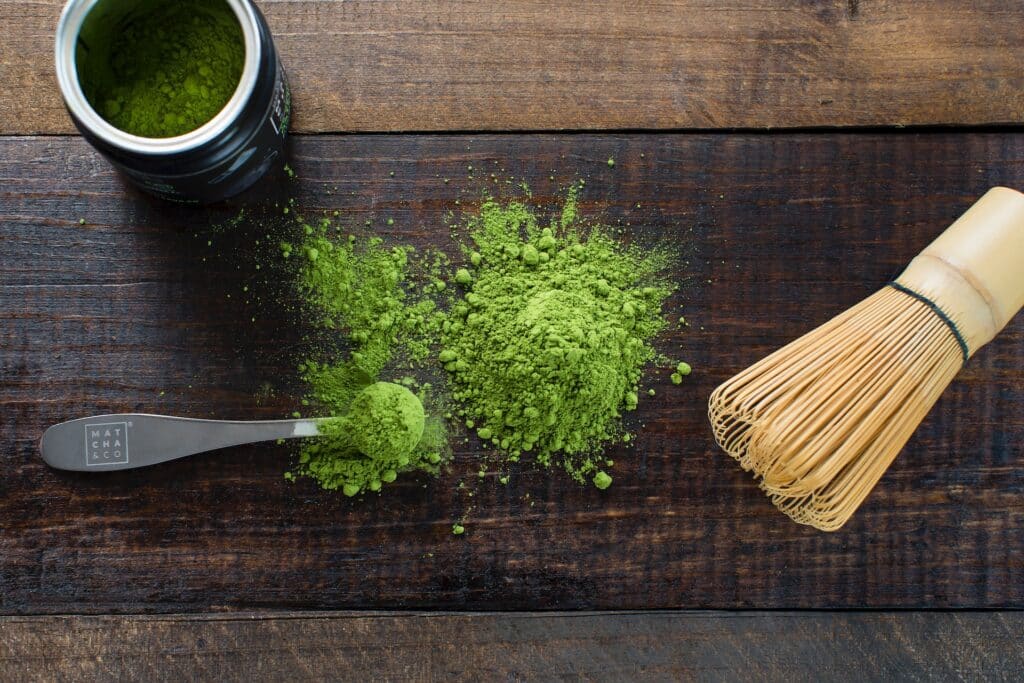Are you planning on having a baby soon, or is someone close to you expecting one? In either case, you might be aware of how strong pregnancy cravings can be. It makes you want to consume foods and drinks while ignoring the side effects altogether. So, if matcha tea is one of your weaknesses, this article will outline the risks and benefits.
With caffeine intake being a major concern for pregnant women, it’s natural to question whether matcha green tea consumption is safe for you and your baby.
Always check with your physician. Matcha tea consumption during pregnancy can be a safe and healthy choice. However, it’s essential to pay attention to your daily caffeine intake and choose high-quality matcha green tea powder or loose-leaf tea options.
So, let’s dive in and learn more about the effects of caffeine consumption on pregnancy and the safe amount of matcha tea for expecting mothers.
What Is Matcha Tea?
You might have heard people consuming green tea and other herbal teas for their health benefits. Undoubtedly, most of these teas contain anti-inflammatory properties, which can help ease your brain’s functions. Therefore, people develop better focus and make it a habit to consume one cup early in the morning.
What makes green tea, matcha, and what does it contain? Matcha tea is another name for green tea containing a larger amount of chlorophyll substance. Thus, it also has a rich green color which comes from the plant Camellia Sinensis. When the plants remain covered for a longer period, they develop a darker color shade. Matcha contains all the nutrients from the dark plant leaf hence it is enriched in antioxidants.

Is Matcha Good for Pregnant Women?
During pregnancy, the fetus goes through a developing phase. However, since green teas contain caffeine, they can cross the placenta. Additionally, high levels of caffeine consumption during pregnancy lead to problems such as preterm birth. Therefore, if you are expecting a baby, limit your caffeine intake to no more than 200 mg per day.
Since a typical cup of matcha tea contains 50 mg or more of caffeine, this amount is similar to that of most green teas. However, the actual caffeine content can vary depending on the brewing method.
Some loose-leaf tea blends and green tea extracts may have higher levels of caffeine than matcha powder. Hence, it’s essential that you read labels carefully and go for low-caffeine products. We also suggest that you refer to a healthcare professional. A professional nutritionist has better knowledge about how green tea extracts are safe for you during this time.
What Caffeine Amount Is Considered Safe for an Expectant Woman?
You may have heard about the relationship between miscarriage and caffeine consumption. Some studies have suggested the same, but the evidence is not conclusive. Moreover, there is no sufficient research on the matter as well.
Hence, the final decision about how much caffeine to consume during pregnancy should be based on an individual’s unique health status. You should also consider the risk factors and talk to your doctor about the pregnancy and matcha.
Benefits of Matcha During Pregnancy
Where the caffeine amount should not exceed a certain limit, matcha has some benefits too. Matcha powder comes with anti-inflammatory properties, which can help eliminate stress and flush out toxins. Additionally, matcha green tea consumption has been linked to improved brain function and a lower risk of chronic diseases.
However, it’s crucial to keep track of the amount of caffeine you add to your daily diet. In addition, choosing a high-quality matcha powder or loose-leaf tea can aid in minimizing the potential risks.
Who Should Avoid Drinking Matcha?
Exceeding the recommended consumption of matcha green tea may have adverse health effects. Since the presence of the chemical L-theanine boosts energy levels, it also contains caffeine. Too much caffeine consumption may lead to diarrhea, fatigue, headaches, and other health issues.
Thus, matcha tea is not for you if you have a sensitive stomach that reacts severely to acidity. Moreover, if you are taking blood-thinning medications, you should avoid drinking matcha tea. Pregnant women must limit their matcha tea intake to avoid complications.
Matcha Powders, Lattes and Other Products During Pregnancy
Matcha green tea powder, along with other green and herbal teas, is gaining popularity day by day. But because of worries about caffeine during pregnancy, many women who are expecting may wonder if matcha products are safe.
While matcha powder does contain caffeine, there are positive effects as well. Matcha powder has a chemical called L-theanine, which is linked to reducing stress and maintaining metabolism. Additionally, matcha green tea consumption has been linked to improved brain function, increased metabolism, and a lower risk of chronic diseases.
It’s important to keep in mind that the amount of caffeine in matcha powder and other green tea products can vary greatly, with some having much more caffeine than others. For example, a matcha latte may contain more caffeine than a simple cup of brewed matcha tea.
Furthermore, pregnant women should opt for high-quality matcha powder and other green tea products to minimize potential risks. Avoid products that contain green tea extract, which may have higher levels of caffeine and potentially harmful compounds. Choosing loose-leaf tea options can also provide a safer alternative to packaged products that may contain additives and artificial sweeteners.
In conclusion, while matcha powders, lattes, and other products can be safe for consumption during pregnancy, it’s essential to pay attention to caffeine content, choose high-quality products, and consult with your healthcare provider to determine the safest caffeine intake levels for you and your baby.

Matcha Tea Recipe for Pregnancy
If you don’t want to skip out on your favorite drink during pregnancy, you must adopt the following custom recipe for matcha tea.
List of Ingredients:
● 1/2 teaspoon matcha powder
● 1 cup hot water
● Honey or sweetener (optional)
● ⅓ cup of skimmed milk or other non-dairy milk (optional)
Directions for Preparing Matcha Tea:
Follow the steps below for preparing the matcha tea during pregnancy:
- Start with a kettle or a pot. Begin by adding water and let it boil for a few minutes. Reduce the flame till it reaches a temperature of around 170-180°F (77-82°C).
- Take a small bowl and sift 1/2 teaspoon of matcha powder.
- Once the water is ready, scoop the desired amount of matcha powder using a bamboo scoop or teaspoon and sift it through to remove any clumps.
- Then, place the sifted matcha powder into a heat-resistant container or matcha bowl.
- Next, add a little matcha powder to the boiled water, around 2-3 tablespoons, and stir.
- You may add honey or another sweetener if desired. However, this step is optional.
- For added creaminess, add 1/4 cup of unsweetened almond milk or another non-dairy milk and stir. One way is to add a splash of milk or non-dairy milk, such as almond or oat milk, to the matcha tea. This can help mellow out the bitterness of the matcha while adding a creamy texture.
- That is it, serve hot and enjoy!
It’s essential to note that the caffeine content may vary depending on the quality of the matcha powder and the brewing method used. If you still have any concerns about caffeine consumption, pay a visit to your doctor to discuss your pregnancy in detail.
Frequently Asked Questions (FAQs)
Below are a few queries related to matcha green tea during pregnancy:
1. What should I do if my caffeine consumption is having a direct impact on my baby?
This caffeine-related concern will arise for most breastfeeding mothers. When a newborn is sensitive to caffeine, they may have trouble sleeping and feel tired. In such cases, caffeine intake by a breastfeeding mother may be linked to excessive caffeine intake in the baby.
Depending on the severity of your baby’s symptoms and your circumstances, your healthcare provider may recommend reducing your caffeine intake or eliminating it. Therefore, you may also be advised to monitor your baby’s symptoms closely and track your caffeine intake to determine if there is a correlation. This can help identify any potential triggers for your baby’s symptoms and adjust your caffeine intake accordingly.
2. Can matcha tea affect my baby’s weight if I consume it during pregnancy?
Although there is no proven evidence regarding matcha green tea having a direct relation to a baby’s weight, moderation is the key. No matter what type of tea or coffee you like to enjoy during pregnancy, always follow the moderate amounts of caffeine content.
Final Thoughts
While matcha powder and other green teas offer numerous health benefits, it’s crucial to remember that caffeine consumption in excess can have adverse effects on both you and your baby. So, it’s best to limit the amount of caffeine you drink each day to 200 mg or less and talk to your doctor about the safest and most appropriate amount of caffeine for you to drink while you’re pregnant.
Matcha green tea can be a healthy addition to your pregnancy routine if you watch how much caffeine you drink and choose high-quality teas.
Sources
- https://www.pregnancyfoodchecker.com/matcha-tea-safe-pregnancy/
- https://www.gotmatcha.com/matcha-and-pregnancy/
- https://blog.pregistry.com/matcha-tea-pregnancy/
- https://www.chalait.com/blogs/matcha-benefits/drinking-matcha-in-pregnancy
- https://www.sciencedirect.com/science/article/pii/S1319562X21003557

